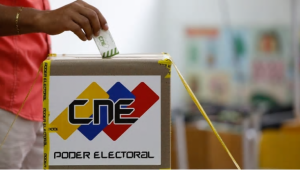Carlos Sánchez Berzaín
Published on December 6, 2018
 (Interamerican Institute for Democracy) Dictatorships of the 21st Century in the Americas are the result of the expansion of Cuba’s dictatorship today comprised by Venezuela, Nicaragua, and Bolivia. Having originally climbed to power through elections, they successively staged several coups in order to supplant the existing constitutional order until they created a legal bureaucratic scheme contrary to democracy. With their methodology that includes fraud and other crimes, they manipulate the electoral system to indefinitely retain power. They have turned elections into a derisive simulation, something that must be dealt with one of the options of civil resistance, abstention from voting, in order to recover democracy.
(Interamerican Institute for Democracy) Dictatorships of the 21st Century in the Americas are the result of the expansion of Cuba’s dictatorship today comprised by Venezuela, Nicaragua, and Bolivia. Having originally climbed to power through elections, they successively staged several coups in order to supplant the existing constitutional order until they created a legal bureaucratic scheme contrary to democracy. With their methodology that includes fraud and other crimes, they manipulate the electoral system to indefinitely retain power. They have turned elections into a derisive simulation, something that must be dealt with one of the options of civil resistance, abstention from voting, in order to recover democracy.
Holding “periodic, free, fair, elections and based on universal and secret suffrage as an expression of the peoples’ sovereignty” is an essential component of democracy made mandatory by Article 3 of the Interamerican Democratic Charter, that is possible if only concurs with “respect for human rights and basic individual freedoms” the “Rule of Law”, a “plural regime of political parties and organizations”, and the “separation and independence of the branches of government”.
The dictatorial nature of a regime is proven by its violation of all essential components of democracy through the supplanting of the democratic order, manipulation of constituent assemblies, referendums, consults and elections, down to the imposition of a fraudulent legal framework, a “legal” scheme, that nowadays is the legal system in existence in Venezuela, Nicaragua, Bolivia, and Correa’s Ecuador. It’s all about the dictatorial statutes that have replaced the institutionalism of the “Republic” with “despicable laws” to ensure their impunity and indefinite tenure in the government.
Hugo Chavez and Nicolas Maduro in Venezuela, Daniel Ortega in Nicaragua, Evo Morales in Bolivia, and Rafael Correa in Ecuador, eliminated the separation and independence of the branches of government using the mechanism of electoral manipulation. They elevated the electoral institution as “another branch of the government” and by designating their officials they made disappear any possibility of impartiality, manipulating every area; from the identification processing of the citizenry, their voter’s registration, their electoral districts, rendering the eligibility of candidates, their campaigns, and the results.
The repeated, flawed, electoral processes with manipulated outcomes were useful to the Castroist Chavist dictators to insist in presenting themselves as “Presidents” and to make their inadmissible dictatorships into a mockery of democracy. When they lost elections or referendums, in-spite of fraud and manipulation, they used further manipulation of the other branches of the government they also controlled, such as the Judicial and/or Legislative in order to illegally and illegitimately remain in power, just as it happened with Chavez in 2005-2007, with Maduro in 2015 and 2018, with Ortega since 2009, with Morales in 2009, 2014, and current crimes being perpetrated in preparation for 2019.
When an electoral process lacks the conditions of democracy and there is no guarantee of transparency, this cannot be free and fair elections and then the opposition and the resistance have but only two options; participate or abstain. The opposition’s participation in elections under a Castroist Chavist dictatorship uniformly presents candidates who are “functional” meaning useful, for the regime, and are rife of fraud, manipulation of results, and guarantee the permanence in power of the dictator.
Venezuela has taught us at least three ways to deal with elections under a dictatorship: 1. The total abstention in the Parliamentary Elections of 2005 that enabled for Chavez’s total control at a moment in time of dictatorial consolidation. 2. The opposition’s unity with the Mesa de la Unidad Democratica (MUD in Spanish) political party that won the presidential election of 2013 that it was not able to defend, and that had also won the Parliamentary Elections of 2015 with the control of 2/3 of the ignored, then persecuted, and then supplanted National Assembly by Maduro. 3. The abstention at the 2018 presidential elections that took Nicolas Maduro’s dictatorship to the illegality and illegitimacy, with the concurrence of two opposition’s candidates who were visibly very functional and an estimated abstention rate of 70%.
When the regime’s candidate controls all; the policy, the electoral and judicial officials, when he/she has all of the country’s and corruption’s resources, he/she can exert intimidation and grant favors to electors and elected, can control the press, and can have a monopoly of the electoral propaganda and there is no chance or possibility to have free elections.The Venezuelan people’s abstention in May of 2018 is an option that delegitimizes the regime and marks its unavoidable fall. Abstaining from voting is civil resistance to dictatorships that make out of manipulated elections their alibi to simulate a non-existent democracy.
*Attorney & Political Scientist. Director of the Interamerican Institute for Democracy.
Published in Spanish by Infobae.com Sunday, December 2nd, 2018
 Carlos Sanchez Berzain Abogado | Estadista | Político | Politólogo
Carlos Sanchez Berzain Abogado | Estadista | Político | Politólogo
